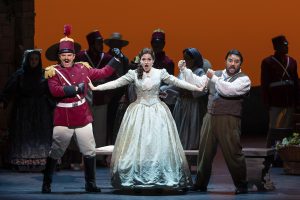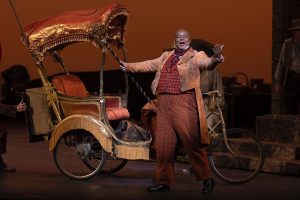
By Rosie Rogers
One of the most exciting things about opera is the indulgence and relatability of its heightened emotions, and what’s more relatable than the uncertainty of love? Directed by Fenlon Lamb, Palm Beach Opera’s production of Donizetti’s The Elixir of Love created this relatability by telling a love story that is as earnest as it is silly.
Gorgeous lighting throughout the show created the atmosphere of a neverland Basque countryside. The background began as a warm golden glow slanting across the stage to show the afternoon sun, and darkened progressively throughout the show to show the passage of time and enhance the story’s changing moods.
The costuming, by Johan Engels, emphasized the class difference between Adina and Nemorino. Her carefully buttoned dress, little parasol, and china teacup set her apart from the people who work her land; the other women gathered around her were differentiated by their wide belts and practical vests. Nemorino’s loose trousers and crumpled shirt serve the same purpose, clearly setting him apart from Adina’s upper-class status.
Adina and Nemorino were wonderfully played by soprano Andriana Chuchman and tenor Mario Chang. Chuchman lept deftly between swift mood changes, showing the character’s playful nature. She soared effortlessly above the orchestra at the end of “Della crudele Isotta,” and her impressive coloratura leaps were crystal-clear.
As Nemorino sang his opening aria, “Quanto è bella, quanto è cara,” he and Adina were each spotlighted, while the townspeople behind them all froze and faded into the warm background. This transformed the stage into a naturalist painting, creating a backdrop for Chang to reveal himself as a strong yet supple tenor, capable of both power and sweetness, and an actor with convincing charm and honesty.
From the moment baritone Alexey Lavrov’s Belcore entered the stage with an exaggerated swaggering walk, it was clear that he leaned into the comic. His antics got a lot of laughs, but immediately removed him as a serious romantic rival to Nemorino. This alleviated some of the tension from the show, but pleasantly so, making space for a more relaxed story. Bass-baritone Musa Ngqungwana’s Dulcamara entered dressed in a sparkling orange-on-orange-on-orange outfit. Although Ngqungwana’s impressive quick-talking performance occasionally outpaced the orchestra, his comedic timing made him a delightful swindler.

Dulcamara introduced fourth-wall breaks into the production, an element which was used three times. He spread his arms down to the maestro in the pit, asking for music, and conductor David Stern called back, “Of course!” Later on, Nemorino stood up and asked Stern for a moment, and in the second act Belcore turned to the audience with a loud cough and stopped our applause for Nemorino. These choices built upon the diegetic moments written into the opera, adding comedy and involving the audience, which increased the storybook feeling of the production.
By the end of the first act, the light became a rich red, intensifying the drama when Adina and Nemorino are most separated from one another emotionally. In the second act the color deepened to purple, and as night fell, a warm yellow glow was cast from inside the ivy-grown stone buildings of the set.
Soprano Alexandra Razskazoff as Giannetta was coy and confident as she led the rest of the village bachelorettes in their pursuit of the newly wealthy Nemorino. Chang’s performance in his famous “Una furtiva lagrima” was excellent, beginning sorrowful and pensive and building into a passionate and powerful B section. Chang showed complete control of color and tone throughout.
The light made its final shift into dark blue as Nemorino and Adina are finally completely honest with one another. Chuchman sang Adina’s confession of her feelings to Nemorino with utter sweetness, placing each embellishment perfectly.
Lamb’s cohesive direction created a consistent tone, effectively balancing lightness and sweetness, and Connie Yun’s atmospheric lighting elevated the show to the realm of fairytale. While occasionally lagging behind in the quickest moments, Stern’s orchestra was consistently great. The show was grounded, comedic, and elevated all at once, and the spectacular performances of the two leads created a delightful experience overall.
The final show of the Palm Beach Opera season is Franz Lehár’s operetta The Merry Widow, which will be performed March 25-27 at the Kravis Center. Jennifer Rowley will sing Hanna, and Andrew Manea is Danilo. For more information, call 561-833-7888 or visit pbopera.org.